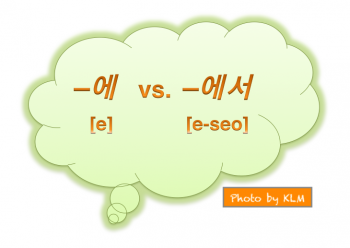Location Nouns and Markers in Korean #2: -에 and -에서 Posted by Kyung-Hwa on May 30, 2018 in Grammar, Korean Language, Vocabulary
This is the series of Location Nouns and Markers in Korean. The last post was about a list of vocabulary words regarding places in Korean, and this post will introduce the use of these location/direction markers, “–에” and “–에서” in sentences.
Before we talk about these two markers, “[e] –에 ” and” [e-seo] –에서 ”, I hope you had an opportunity to learn some location nouns in Korean.
As I mentioned in the last post, “[e] –에 ” and” [e-seo] –에서 ” act as prepositions, such as , “at, in, from, and to” in English.
♣ “[e] –에 ” is used to express:
- existence of someone or something
- direction or destination of movement
When you attach “–에 ” to a location noun (place) and use a verb, [it-da] 있다 (“to have/own” or “Is there-“), it is used to indicate the existence or location of someone or something.
For examples, if someone ask you, “Where is she?”
Your answer could be: location noun (place) + 에 + 있다
1. Polite form: [hak-kyo-e it-seo-yo] 학교에 있어요. (She is at school.)
2. Polite form: [han-gook-e it-seo-yo] 한국에 있어요. (She is in Korea.)
For examples, if someone ask you, “Where is your computer?
Your answer could be: location noun (place) +에 + 있다
3. Polite form: [hoe-sa-e it-seo-yo] 회사에 있어요. (It is at work.)
4. Polite form: [jip-e it-seo-yo] 집에 있어요. (It is at home.)
“–에 ” is also used to refer to a direction or destination of movement with verbs such as,
가다 (to go), 오다 (to come), 들어가다 (to enter), and so on.
For examples, if someone ask you, “Where are you going today?”
Your answer could be: location noun (place) + 에 + 가다 (to go)
5. Polite form: [byeong-won-e ga-yo] 병원에 가요. (I am going to a hospital.)
6. Polite form: [mi-yong-sil-e ga-yo] 미용실에 가요. (I am going a beauty salon.)
7. Polite form: [sang-il-pa-ti-e ga-yo] 생일파티에 가요. (I am going to a birthday. )
♣ “[e-seo] –에서 is used to mark the departure place or the place of the action.
For examples, if someone asks you, “Where are you coming from?”
Your answer could be: location noun (place) + 에서 + 오다 (to come)
8. Polite form: [gong-hagn-e-seo wa-yo] 공항에서 와요. (I am coming from an airport.)
9. Polite form: [young-hwa-kwan-e-seo wa-yo] 영화관에서 와요. (I am coming from a movie theater.)
For examples, if someone asks you, “Where do you meet your friend?”
Your answer could be: a location noun (place) + 에서 + 만나다 (to meet)
10. Polite l: [hak-kyo-e-seo man-na-yo] 학교에서 만나요. (I meet my friend at school.)
11. Polite l: [Je-joo-do-e-seo man-na-yo] 제주도에서 만나요. (I meet my friend at Jejoo Island.)
These are small words, but the correct usage of these markers will help you deliver your message in a clearer way when you have a conversation with Korean speakers.
감사합니다. (Thank you!)

Build vocabulary, practice pronunciation, and more with Transparent Language Online. Available anytime, anywhere, on any device.





Comments:
Dominica:
I would say I really admire you. though we have something in common because I also take joy in singing, reading books and learning new languages and cultures but I am as courageous and hard working as you are. 참 잘했어요 경화 씨.
Kyung-Hwa:
@Dominica 안녕하세요!
감사합니다. Thank you so much for your sweet comment ^___^
I am happy to hear that we share similar intersts.
Singing and playing the piano give me a sense of elation.
To challenge myself, I am practicing few songs in Spanish and French lately.(work in progress ^^)
좋아하는 한국 노래가 있어요? – Do you have any Korean song that you like (to sing)?